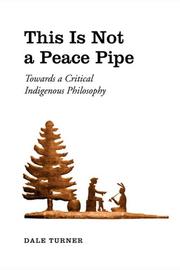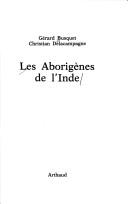| Listing 1 - 10 of 451 | << page >> |
Sort by
|
Book
ISBN: 1412374790 Year: 2008 Publisher: Chicoutimi, Quebec : J.-M. Tremblay,
Abstract | Keywords | Export | Availability | Bookmark
 Loading...
Loading...Choose an application
- Reference Manager
- EndNote
- RefWorks (Direct export to RefWorks)
Periodical
Year: 2008 Publisher: [Winnipeg] : Manitoba First Nations Education Resource Centre.
Abstract | Keywords | Export | Availability | Bookmark
 Loading...
Loading...Choose an application
- Reference Manager
- EndNote
- RefWorks (Direct export to RefWorks)
Indians of North America --- Native peoples --- Education --- Manitoba.

ISBN: 0802080162 0802037925 9780802080165 9780802037923 Year: 2006 Publisher: Toronto : University of Toronto press,
Abstract | Keywords | Export | Availability | Bookmark
 Loading...
Loading...Choose an application
- Reference Manager
- EndNote
- RefWorks (Direct export to RefWorks)
Ethnophilosophy --- Indigenous peoples --- Indigenous peoples --- Indigenous peoples --- Indigenous peoples --- Indigenous peoples --- Native peoples --- Native peoples --- Native peoples --- Native peoples --- Native peoples --- Native philosophy --- Civil rights --- Legal status, laws, etc. --- Government relations. --- Intellectual life. --- Politics and government. --- Civil rights --- Legal status, laws, etc. --- Government relations. --- Intellectual life. --- Politics and government.
Book
ISBN: 9780774818872 9780774818889 Year: 2011 Publisher: Vancouver University of British Columbia press
Abstract | Keywords | Export | Availability | Bookmark
 Loading...
Loading...Choose an application
- Reference Manager
- EndNote
- RefWorks (Direct export to RefWorks)
Some assume that Canada earned a place among postcolonial states in 1982 when it took charge of its Constitution. Yet despite the formal recognition accorded to Aboriginal and treaty rights at that time, Indigenous peoples continue to argue that they are still being colonized. Grace Woo assesses this allegation using a binary model that distinguishes colonial from postcolonial legality. She argues that two legal paradigms governed the expansion of the British Empire, one based on popular consent, the other on conquest and the power to command. During the twentieth century, international law formally rejected the conquest model. However, despite the best intentions of lawyers and judges, the beliefs and practices of the colonial age continue to haunt Supreme Court of Canada rulings concerning Indigenous rights. The binary analysis applied in Ghost Dancing with Colonialism casts explanatory light on ongoing tensions between Canada and Indigenous peoples, suggesting new ways to bridge the cultural divide and arrive at a truly postcolonial justice system
Imperialism --- Native peoples --- Native peoples --- Autochtones --- Autochtones --- Imperialisme --- Legal status, laws, etc --- Government relations --- Droit --- Relations avec l'Etat --- Canada. --- Canada. --- Canada. --- Canada.
Book
ISBN: 2080662309 9782080662309 Year: 1988 Publisher: Paris Flammarion
Abstract | Keywords | Export | Availability | Bookmark
 Loading...
Loading...Choose an application
- Reference Manager
- EndNote
- RefWorks (Direct export to RefWorks)
Indigenous peoples. --- Indigenous peoples --- Aboriginal peoples --- Aborigines --- Adivasis --- Indigenous populations --- Native peoples --- Native races --- Ethnology

ISBN: 2700303490 9782700303490 Year: 1981 Publisher: Paris Arthaud
Abstract | Keywords | Export | Availability | Bookmark
 Loading...
Loading...Choose an application
- Reference Manager
- EndNote
- RefWorks (Direct export to RefWorks)
Ethnology --- Adivasis --- Caste --- Aboriginal peoples --- Aborigines --- Indigenous populations --- Native peoples --- Native races --- Ethnology - India
Book
ISBN: 9264167943 9264692533 9264717749 Year: 2019 Publisher: Paris, France : OECD,
Abstract | Keywords | Export | Availability | Bookmark
 Loading...
Loading...Choose an application
- Reference Manager
- EndNote
- RefWorks (Direct export to RefWorks)
"The 38 million Indigenous peoples living across 12 OECD countries contribute to stronger regional and national economies, and have unique assets and knowledge that address global challenges such as climate change. Supporting their economic inclusion at local and regional levels is essential to achieving the promise of the Sustainable Development Goals to "leave no-one behind" and overcoming the significant gaps in well-being that continue to exist between Indigenous and non-Indigenous populations, notably in rural areas. This report provides recommendations to achieve vibrant local and regional Indigenous economies that deliver on their objectives for development by: improving Indigenous statistics and data governance; enabling policies for entrepreneurship and small business; providing instruments to mobilise land for development; and implementing effective and inclusive governance to support a place-based approach"--Page 4 of cover.
Indigenous peoples. --- Aboriginal peoples --- Aborigines --- Adivasis --- Indigenous populations --- Native peoples --- Native races --- Ethnology
Book
ISBN: 1552388069 1552388042 Year: 2015 Publisher: Calgary, Alberta : Ottawa, Ontario : University of Calgary Press, Canadian Electronic Library,
Abstract | Keywords | Export | Availability | Bookmark
 Loading...
Loading...Choose an application
- Reference Manager
- EndNote
- RefWorks (Direct export to RefWorks)
"For indigenous communities throughout the globe, mining has been a historical forerunner of colonialism, introducing new, and often disruptive, settlement patterns and economic arrangements. Although indigenous communities may benefit from and adapt to the wage labour and training opportunities provided by new mining operations, they are also often left to navigate the complicated process of remediating the long-term ecological changes associated with industrial mining. In this regard, the mining often inscribes colonialism as a broad set of physical and ecological changes to indigenous lands. This collection examines historical and contemporary social, economic, and environmental impacts of mining on Aboriginal communities in northern Canada. Combining oral history research with intensive archival study, this work juxtaposes the perspectives of government and industry with those of local communities. The oral history and ethnographic material provides an extremely significant record of local Aboriginal perspectives on histories of mining and development in their regions."--
Mineral industries --- Native peoples --- Oral history --- History. --- Political aspects --- Social aspects --- Environmental aspects --- Economic aspects
Book

ISBN: 1003021514 9781003021513 9781000095876 1000095878 9781000095906 1000095908 9781000095937 1000095932 9780367898557 0367898551 9780367898588 0367898586 Year: 2020
Abstract | Keywords | Export | Availability | Bookmark
 Loading...
Loading...Choose an application
- Reference Manager
- EndNote
- RefWorks (Direct export to RefWorks)
What counts as 'indigenous religion' in today´s world? Who claims this category? What are the processes through which local entities become recognisable as 'religious' and 'indigenous'? How is all of this connected to struggles for power, rights and sovereignty? This book sheds light on the contemporary lives of indigenous religion(s), through case studies from Sápmi, Nagaland, Talamanca, Hawai'i, and Gujarat, and through a shared focus on translations, performances, mediation and sovereignty. It builds on long term case-studies and on the collaborative comparison of a long-term project, including shared fieldwork. At the center of its concerns are translations between a globalising discourse (indigenous religion in the singular) and distinct local traditions (indigenous religions in the plural). With contributions from leading scholars in the field, this book is a must read for students and researchers in indigenous religions, including those in related fields such as religious studies and social anthropology.
Indigenous peoples --- Religion. --- Religion --- Aboriginal peoples --- Aborigines --- Adivasis --- Indigenous populations --- Native peoples --- Native races --- Ethnology
Book
ISBN: 9791036560538 9568416927 Year: 2020 Publisher: Santiago Ariadna Ediciones
Abstract | Keywords | Export | Availability | Bookmark
 Loading...
Loading...Choose an application
- Reference Manager
- EndNote
- RefWorks (Direct export to RefWorks)
Set of works of renowned Latin American intellectuals about the current political and social situation in our region, especially after the events of Ecuador, Brazil and Chile
Latin America --- Social conditions --- Politics and government --- Central government policies --- democracy --- neoliberalism --- native peoples --- good living
| Listing 1 - 10 of 451 | << page >> |
Sort by
|

 Search
Search Feedback
Feedback About UniCat
About UniCat  Help
Help News
News